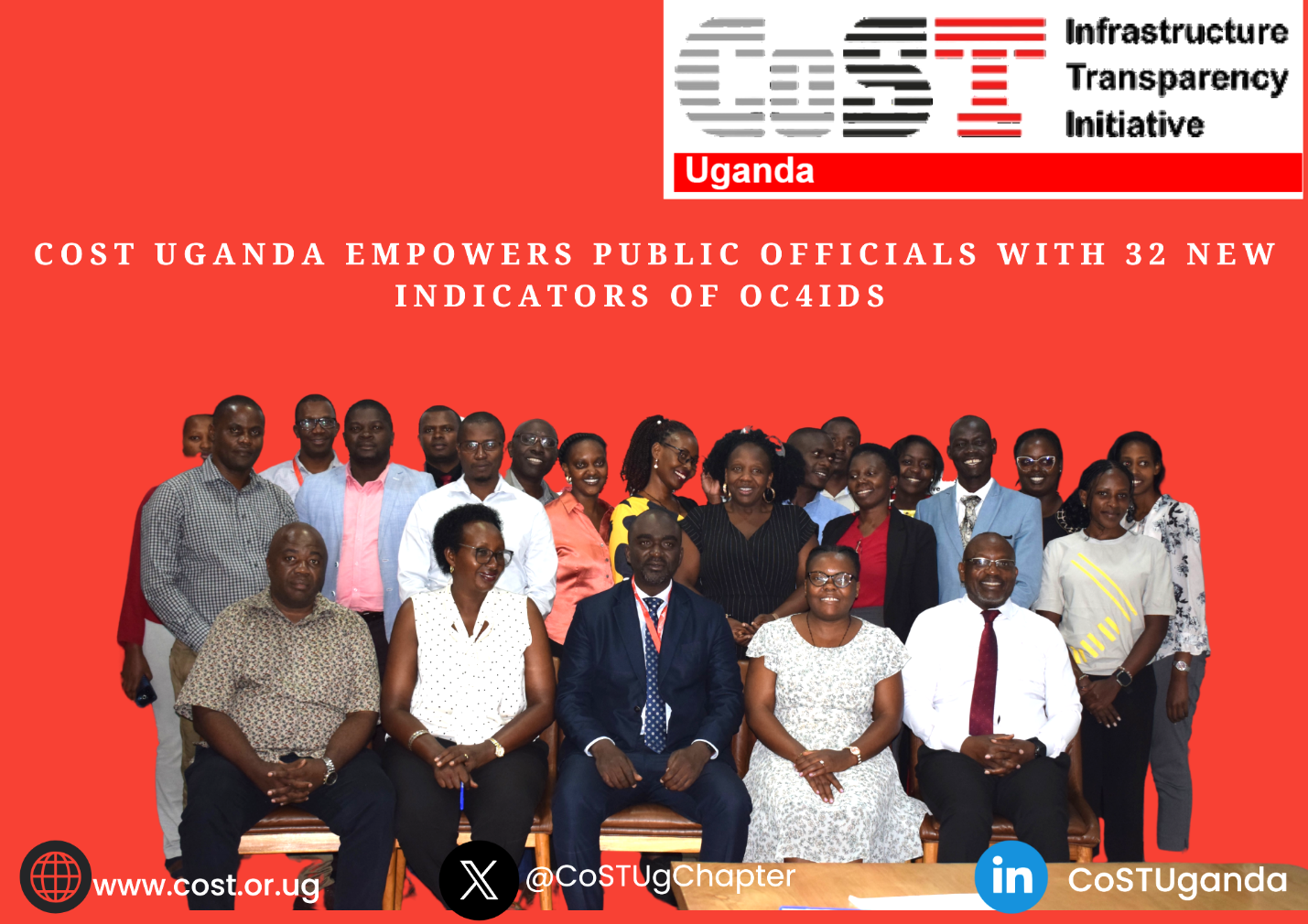
On June 5th, 2025, a total of 25 Public Officials from Kampala Capital City Authority (KCCA), gathered at Fairway Hotel, Kampala, for a pivotal training organized by CoST Uganda and Africa freedom of Information Centre (AFIC). The training focused on building their capacity in data collection for Project Selection and Appraisal for Public Infrastructure Projects, using 32 newly developed sustainability and climate finance indicators of Open Contracting for Infrastructure Data Standard (OC4IDS).
The training came at a time when Uganda, like many countries, faces challenges of climate change /environment issues, rapid urbanization & population growth rate, and calls for public demand for Accountability. These data points/ indicators are designed to promote Responsible Infrastructure Investment by enhancing Transparency, aligning with OC4IDS modules of environmental, economic, institutional, climate finance and social priorities, while ensuring public value.
Using Data to Turn Insight into Action
In opening remarks, AFIC’s Executive Director, Gilbert Sendugwa emphasized that infrastructure must be responsive to real community needs, and this begins with data. “Citizens lose trust when decisions are made behind closed doors,” he said. “The 32 data points offer a path to evidence-based, inclusive decision-making.”
Re-Imagining the Planning Process
Olive Kabatwairwe Africa Manager and Learning Lead, from CoST IS guided participants through each of the modules of the 32 New data points/indicators covering Economic viability, Environmental sustainability, Institutional capacity, Climate Finance, and social inclusion. She stressed the importance of local content tracking, life-cycle costing, and Transparent procurement as key levers of Accountability.
Officials shared their experiences of collecting data and how political and technical priorities often clash. They also noted that value-for-money assessments and cost-benefit analyses were increasingly being used but lacked consistency due to capacity and funding limitations.
A particularly valuable insight was the call to involve NEMA earlier in project design to improve environmental risk forecasting. Another recommendation was to use the data points not just for reporting, but as a compliance checklist throughout the planning and implementation cycle.
The Data Gap: A National Challenge
Despite the enthusiasm, officials acknowledged real challenges including Weak Early-stage Project Data collection and Reporting, lack of skills in areas like life-cycle costing and climate adaptation planning, Limited Data disclosure for government-funded projects, Limited funding for Government Projects, Limited coordination between agencies and citizens leading to duplication and public no trust gaps. Participants cited examples where poor or absent planning had led to Infrastructure failures. From unmarked construction pits that caused accidents to blocked drainage that intensified urban flooding, the voices in room- “Data matters at every stage of the infrastructure lifecycle”.
These issues not only hamper effective planning but also diminish the potential for public engagement and scrutiny key pillars of infrastructure transparency.
“These indicators/data modules give us the tools to ask the right questions at the right time before decisions are locked in and mistakes become expensive. They shift infrastructure from being top-down to truly people-centered,” “Geoffrey Odong, Manager, CoST Uganda stated”
A Shared Roadmap for Reform
The training concluded with a robust set of Recommendations:
- Institutionalize the 32 data points within planning and budgeting frameworks.
- Invest in capacity-building programs targeting sustainability and risk analysis.
- Mandate the publication of infrastructure data on platforms like the GPP– through PPDA.
- Allocate dedicated budgets for data collection across all funding sources- MoFEPD
- Engage communities throughout the planning process to ensure public ownership- entities
- Standardize the use of OC4IDS across donor and domestic projects- PPDA
- Foster early engagement with regulators such as NEMA– CoST Uganda
- Strengthen internal information sharing across public agencies-KCCA
A Closing Commitment
Representing the Executive Director of KCCA, Mr. Daniel Niweabine closed the event with a firm commitment to sustaining the momentum. He celebrated KCCA’s recognition as Uganda’s top performer in the 2024 CoST ITI and as a pilot institution for the 32 data points.
He reaffirmed their readiness to model the 32 data points in its own project processes. “Publishing infrastructure data is not just a technical task it’s a way to build trust,” he said. “Transparent Infrastructure ensures that public projects reflect public priorities, not private interests.”
A New Standard for Infrastructure in Uganda
The Public officials training marked more than a skills-building session and signaled the start of a deeper transformation. With the right tools, Uganda’s public officials are now better equipped to align Infrastructure with Sustainability goals, public Accountability, and Community value. Citizens can use our social accountability guidance note to learn and exercise transparency and accountability.
With CoST Uganda, Africa Freedom of Information Centre, and Kampala Capital City Authority leading the way, Uganda is redefining what Responsible infrastructure looks like –rooted in data, shaped by people, and built for the future.



